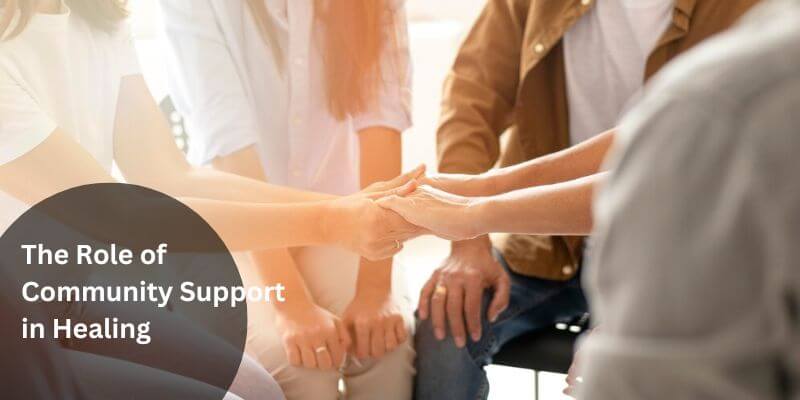The Role of Community Support in Healing
When faced with a cancer diagnosis, the journey towards recovery can be both physically and emotionally draining. In moments like these, the power of community support in healing becomes clear. This support network, comprised of friends, family, and even local organizations, can play a big part in a cancer patient’s recovery process.
Community support in healing goes above and beyond simple companionship, however. It involves a network of understanding, empathy, and practical assistance that can greatly impact a person’s experience with cancer.
Table of Contents
Community Support in Healing
First, The Power of Emotional Support
Emotional support is one of the most intense ways that a community can aid in the healing process. A cancer diagnosis often brings a whirlwind of emotions, including fear, anxiety, and uncertainty. Having a supportive community provides a comforting presence that can help alleviate these emotional burdens.
Friends and family who provide a listening ear, share words of encouragement, or simply spend time with the patient can make a huge difference in their emotional well-being. This emotional support promotes a sense of connection and belonging, which is imperative for mental resilience during the grueling journey of cancer treatment.
Practical Assistance During Treatment
Community support in healing is not limited to emotional encouragement. It also extends to practical assistance. Cancer treatment usually involves frequent medical appointments, treatments, and sometimes hospitalization.
This can be overwhelming, especially for those who are managing these tasks alone. A supportive community can step in by providing practical help like transportation to medical appointments, meal preparation, or assistance with household chores.
These acts of kindness alleviate some of the stress and logistical challenges faced by patients. So, they can focus more on their recovery and less on daily concerns.
Thoughtful Gifts and Gestures
One way that community support can be demonstrated is through kindhearted gifts. Thoughtful breast cancer gifts offer comfort and a sense of care during a challenging time. These gifts can include items like cozy blankets, uplifting books, or personalized items that show a deep understanding of the patient’s needs.
Gifts such as these not only provide practical benefits but also serve as tangible reminders of the support and love that surrounds the individual. They can be especially meaningful when they are customized to the patient’s specific needs or preferences, demonstrating a thoughtful approach to supporting someone with breast cancer.
Working Your Way Along the Path to Recovery
For many patients, a mastectomy is a major step in their cancer treatment journey. Preparing for mastectomy recovery requires careful planning and a supportive environment. Understanding how to be prepared for mastectomy recovery is important for both the patient and their support network.
This preparation might involve arranging for post-surgery care, discussing pain management strategies with healthcare providers, and setting up a comfortable and accessible home environment. Community support plays a major role in this preparation by offering practical help and emotional reassurance.
Family and friends can assist in creating a recovery plan, helping with mobility and comfort during the initial healing period, and providing ongoing support as the patient adjusts to their new normal.
The Impact of Shared Experiences
One of the most profound aspects of community support in healing is the power of shared experiences. Connecting with others who have faced similar challenges can provide invaluable insight and encouragement.
Support groups and cancer survivor networks offer opportunities for patients to share their stories, learn from others, and find strength in the collective experience. These shared experiences create a feeling of camaraderie and understanding that can be extremely comforting and motivating.
Being part of a community that has walked a similar path encourages hope and provides practical advice on dealing with the complexities of cancer treatment and recovery.
Building a Supportive Network
Creating a strong and supportive network requires effort and intention. It involves reaching out, establishing connections, and nurturing relationships that can offer meaningful support. For those supporting someone with breast cancer, it is necessary to be proactive in offering help and expressing genuine concern.
Simple gestures, like checking in regularly, offering to help with specific tasks, or just being present, can make a sizeable difference. Building a network of support involves providing practical assistance, but also showing empathy and understanding.
It is all about creating a circle of care that surrounds the patient with positive energy and reassurance.
The Ripple Effect of Community Support
The benefits of community support go beyond the individual patient to their loved ones and the community at large. When a community rallies around someone facing cancer, it creates a ripple effect of compassion and solidarity.
This collective support creates a culture of caring and resilience that can have a positive impact on everyone involved. It highlights the importance of coming together in times of need and reinforces the idea that healing is not just an individual journey but a shared experience.
The strength and encouragement provided by a supportive community can inspire others to offer similar support in their own circles, creating a network of care that extends far beyond a single diagnosis.
The Role of Community Advocacy
Another aspect of community support in healing is advocacy. In the face of cancer, dealing with the healthcare system and accessing resources can be challenging to say the least. Community advocates, whether they are local cancer support organizations or individual volunteers, play a big part in helping patients and their families understand their options and connect with necessary services.
These advocates can offer guidance on insurance matters, provide information about local resources, and assist with simplifying the complexities of treatment plans. By advocating for patients’ needs and making sure they have access to appropriate care, these dedicated individuals help alleviate some of the stress and confusion associated with a cancer diagnosis.
Their efforts give patients the freedom to focus more on their recovery and less on the logistical hurdles that can arise during this demanding time.
Embracing the Power of Community
The role of community support in healing cannot be stressed enough. It is a multifaceted contribution that involves emotional encouragement, practical assistance, thoughtful gestures, and shared experiences.
For those attempting to work their way down the challenging path of cancer treatment, a supportive community can provide the strength, comfort, and reassurance needed to face each day. Whether through offering practical help, providing thoughtful breast cancer gifts, or being prepared for the complexities of mastectomy recovery, the presence of a caring community makes a profound difference.
Embracing the power of community support not only boosts the healing process but also promotes a sense of connection and hope that is invaluable in the journey towards recovery.
Recommended Articles:
Smiling More and Improved Mental Health
Connection Between Mental and Physical Health




